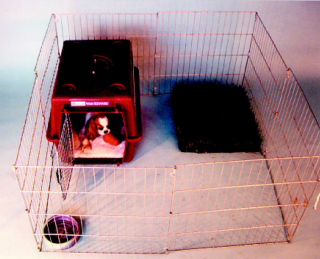Puppy Playroom & Doggy Den

Successful domestic doggy education involves teaching your puppy to train herself through confinement. This prevents mistakes and establishes good habits from the outset. When you are physically or mentally absent, confine your puppy to keep her out of mischief and to help her learn how to behave appropriately.
The more you confine your puppy to her Puppy Playroom and Doggy Den during her first few weeks at home, the more freedom she will enjoy as an adult dog for the rest of her life. The more closely you adhere to the following puppy-confinement program, the sooner your puppy will be housetrained and chewtoy-trained. And, as an added benefit, your puppy will learn to settle down quickly, quietly, calmly, and happily.
When You Are Not at Home
Keep your puppy confined to a fairly small puppy playroom, such as the kitchen, bathroom, or utility room. You can also use an exercise pen to cordon off a small section of a room. This is your puppy’s long-term confinement area, which should include:
1. A comfortable bed
2. A bowl of fresh water
3. Plenty of hollow chewtoys (stuffed with dog food)
4. A doggy toilet in the farthest corner from her bed
Obviously, your puppy will feel the need to bark, chew, and eliminate throughout the course of the day, and so she must be left somewhere she can satisfy her needs without causing any damage or annoyance. Your puppy will most probably eliminate as far as possible from her sleeping quarters — in her doggy toilet. By removing all chewable items from the puppy playpen — with the exception of hollow chewtoys stuffed with kibble — you will make chewing chewtoys your puppy's favorite habit. A good habit!
The Purpose of long-term confinement is:
· To confine the puppy to an area where chewing and toilet behavior are acceptable, so the puppy does not make any chewing or housesoiling mistakes around the house
· To maximize the likelihood that the puppy will learn to use the provided toilet
· To maximize the likelihood that the puppy will learn to chew only chewtoys (the only chewables available in the playroom)
· To maximize the likelihood that the puppy will learn to settle down calmly and quietly, i.e., without barking
When You Are at Home
Enjoy short play and training sessions hourly. If you cannot pay full attention to your puppy’s every single second, play with your pup in his Puppy Playpen, where a suitable toilet and toys are available. Or, for periods of no longer than an hour at a time, confine your puppy to his Doggy Den (short-term close confinement area), such as a portable dog crate. Every hour on the hour, release your puppy and quickly take him to his doggy toilet. Your puppy's short-term confinement area should include a comfortable bed, and plenty of hollow chewtoys (stuffed with dog food).
It is much easier to watch your pup if he is settled down in a single spot. Either you may move the crate so that your puppy is in the same room as you, or you may want to confine your pup to a different room to start preparing him for times when he will be left at home alone. If you do not like the idea of confining your puppy to a dog crate, you may tie the leash to your belt and have the pup settle down at your feet. Or you may fasten the leash to an eye-hook in the baseboard next to your puppy's bed, basket, or mat. To prevent the chewtoys from rolling out of reach, also tie them to the eye-hook.
The Purpose of Short-term Close Confinement is:
· To confine the puppy to an area where chewing behavior is acceptable so the puppy does not make chewing mistakes around the house
· To make the puppy a chewtoyaholic (since chewtoys are the only chewables available and they are stuffed with food)
· To teach the puppy to settle down calmly and happily for periodic quiet moments
· To prevent housesoiling mistakes around the house
· To predict when the puppy needs to eliminate
Dogs naturally avoid soiling their den, so closely confining a puppy to his bed temporarily inhibits urination and defecation. This means the pup will need to relieve himself when released from the crate each hour. You will then be there to show the puppy the right spot, reward him for eliminating in the right spot, and then enjoy a short play/training session with the delightfully empty puppy.
Train Your Puppy to Train Himself
Housetraining and chewtoy-training will be quick and easy if you adhere to the puppy confinement plan above, which prevents the puppy from making mistakes and prompts the puppy to teach herself household etiquette. If you vary from the program, you will likely experience problems. Unless you enjoy problems, you must reprimand yourself for any mistakes you allow your puppy to make.
Want to raise the perfect puppy?
Learn more about puppy training with The Best Online Puppy Training Programs:
The Top Dog Academy. Learn how to set up your pup's crate and playpen, and teach them to love spending time there with videos, worksheets, podcasts, and more. When you join the Top Dog Academy you also get access to personalized email support so you can train your puppy yourself. Use this link to get your first month for free.
SIRIUS Puppy Training. Looking for more support? Get personalized, real-time, video dog training guidance from an expert SIRIUS Puppy Training instructor. Dr. Dunbar's SIRIUS Puppy & Dog Training classes revolutionized the world of pet dogs when they were first created. Now, our online small-group classes allow you to get the expert assistance you need from the comfort of your home.




